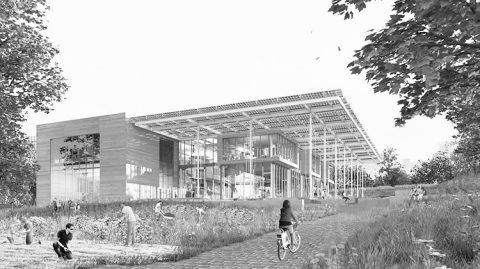From our friends at Georgia Tech, here’s an update on a pilot composting project tied to the Kendeda Building for Innovative Sustainable design. This pilot — like several others now taking place on the Tech campus — will test a sustainable approach that may be adopted when the Kendeda Building opens. And, as the operations staff becomes familiar with the program, Georgia Tech may consider applying it in other buildings.
This fall, the Office of Solid Waste Management & Recycling, Building Services, and the Office of Campus Sustainability launched a pilot composting project in the Roger A. and Helen B. Krone Engineered Biosystems Building (EBB). The project is intended to gather data to put together a best-practices report for the future Kendeda Building for Innovative Sustainable Design, in which compost collection will be featured. New bins specifically designated for collecting compostable materials were placed in the building along with updated signage on recycling 5-slots reflecting the change. Currently, Southern Green picks-up the materials and composts them off-campus.
Since implementation, composting has begun to take root in EBB, with many occupants expressing excitement at the addition. Although diversion rates from landfill waste can still be improved, those who are using the bins are doing so correctly. The project team is consistently fine-tuning the signage around the building to continue improving participation rates. In addition, though the project was originally intended to end after fall semester of this year, it has been extended into the spring. The extension allows more time to test different infrastructure and ensure the process is the best it can be before implementing it in The Kendeda Building.
If you’d like to learn more about the project and why composting is important in addition to what items are compostable, visit recycle.gatech.edu/compost.
The composting pilot is one of several being operating by the university’s facilities staff. Separately, a Living Building Academic Council is funding a separate series of pilot projects with a heavier research focus. Like this website, all the pilot projects are funded through the Kendeda Fund grant that’s paying for the building, its operations and “leverage” activities.





